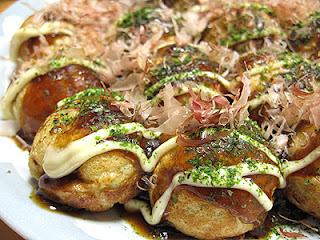"焼く やく yaku" means "to burn something". Some of you might have seen this kanji before.
You know what? Takoyaki and Okonomiyaki have the kanji.
Japanese foods:
たこ焼き-Takoyaki
お好み焼き-Okonomiyaki
Do you know Japanese foods above?
Takoyaki is like below.
Okonomiyaki is like this.
Especially about okonomiyaki, I got some responses that some people want to eat but there is no restaurant serving it. So someday we'll post how to cook.
Other than foods, we have another example.
Example:
それCDに焼くよ。-I will burn it to CD.
(sore CD ni yakuyo)
*
Also it has another pronunciation, "しょう shou". If you see "焼" next to other kanji, we need to pronounce it "しょう shou". However, if you see the kanji with hiragana like above, the pronunciation is "やく yaku". Here, we have new thing to learn. The hiragana is called "送り仮名 おくりがな okurigana", meaning hiragana with Kanji.
Example:
焼 しょう shou: this is part of kanji combination like "燃焼 ねんしょう nenshou"
焼く やく yaku: this is a verb. The "く" is okurinagna here.
Did you understand?
There are some pronunciation on a kanji, and it's so confusing. But do please keep studying.
#Should you have any kanji you wanna know, please leave a comment or contact share.your.japan[at]gmail.com.

























